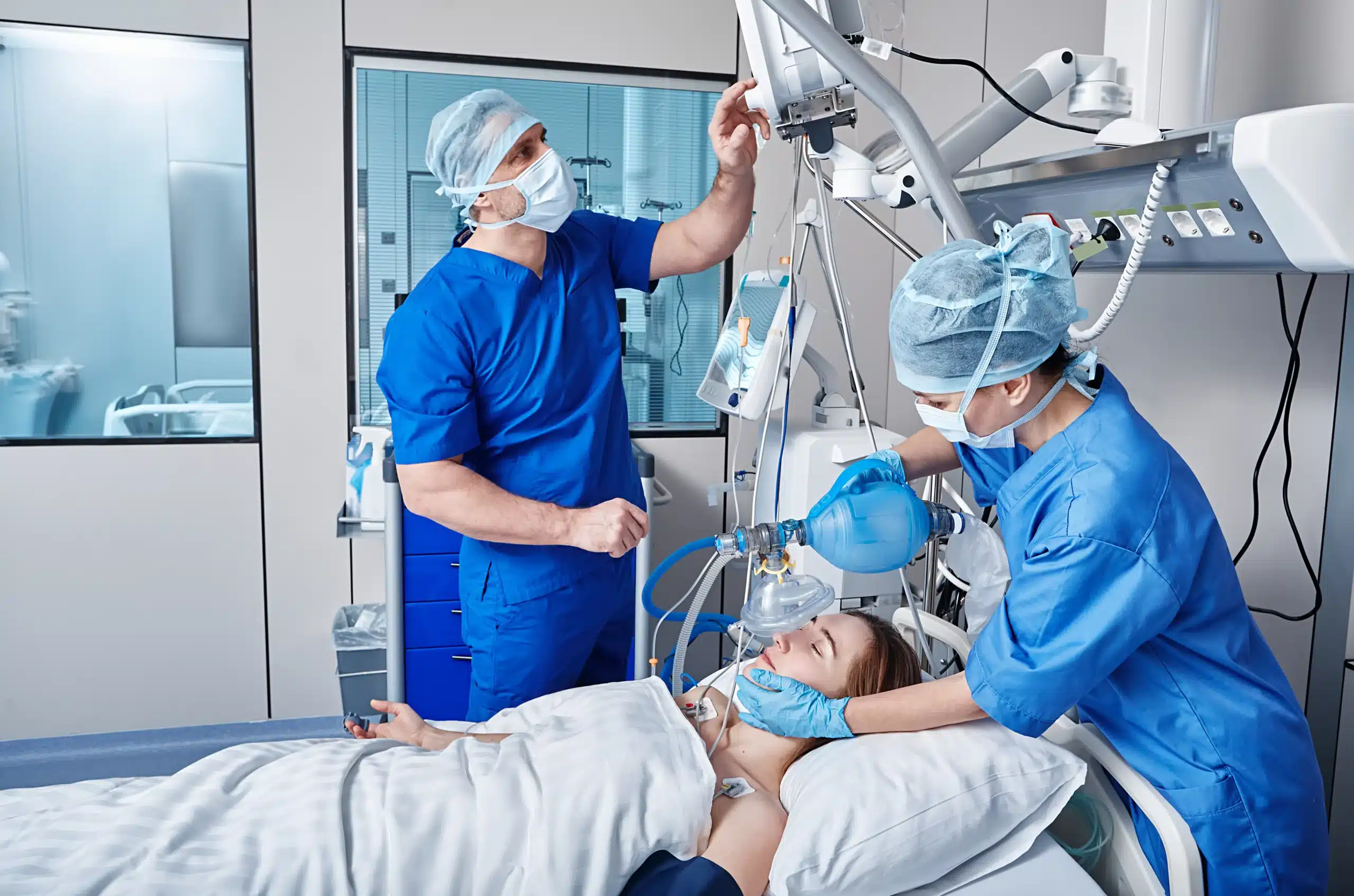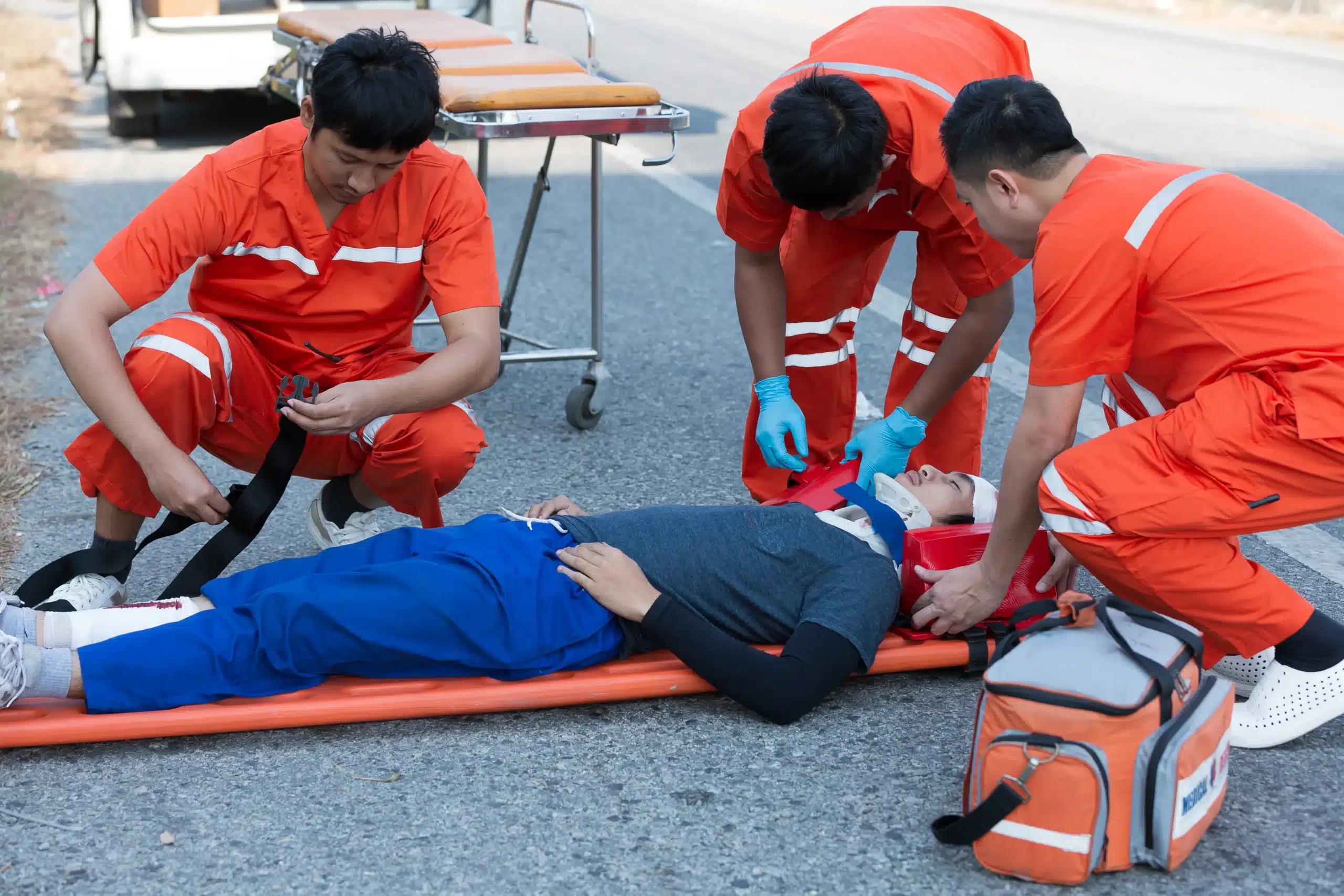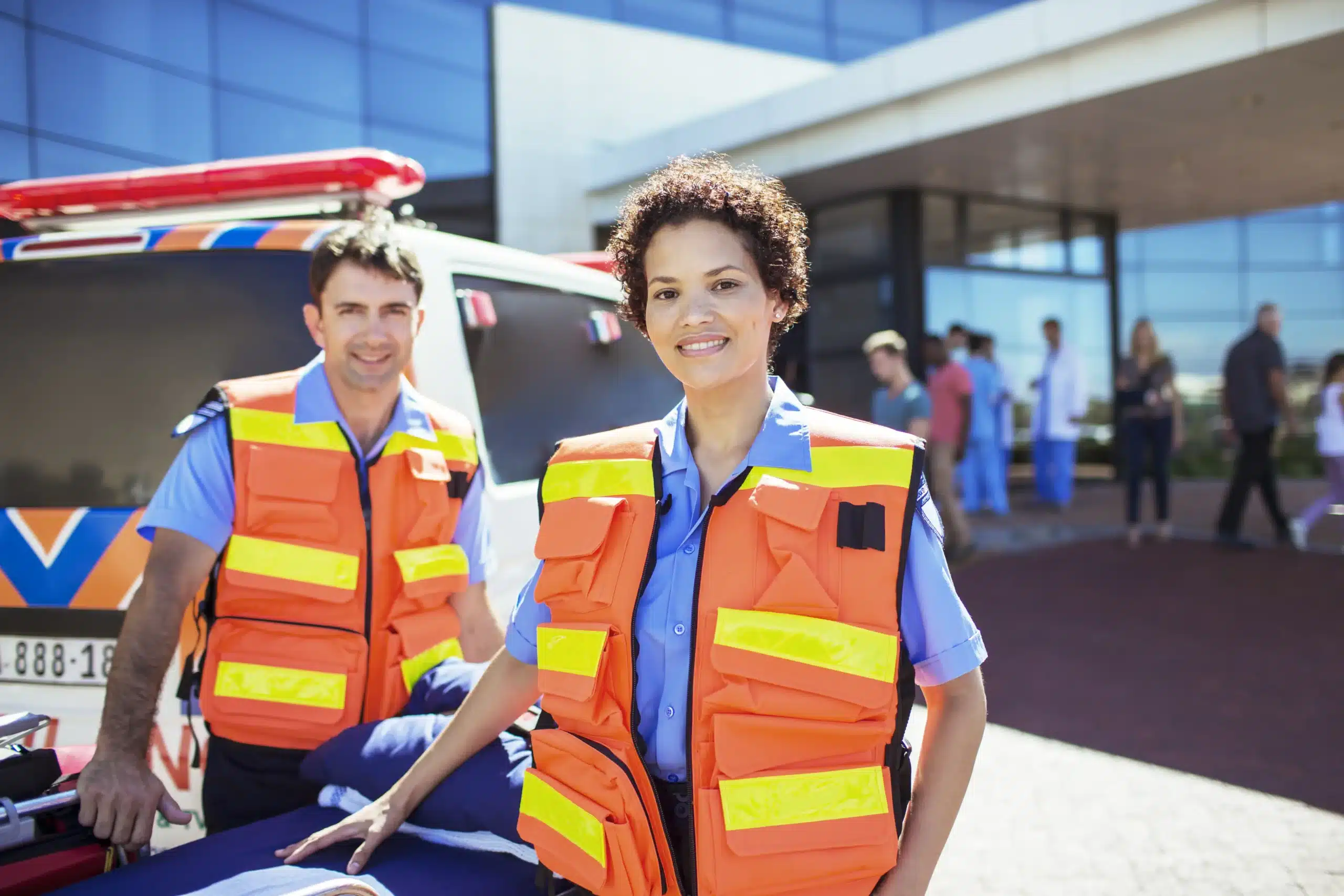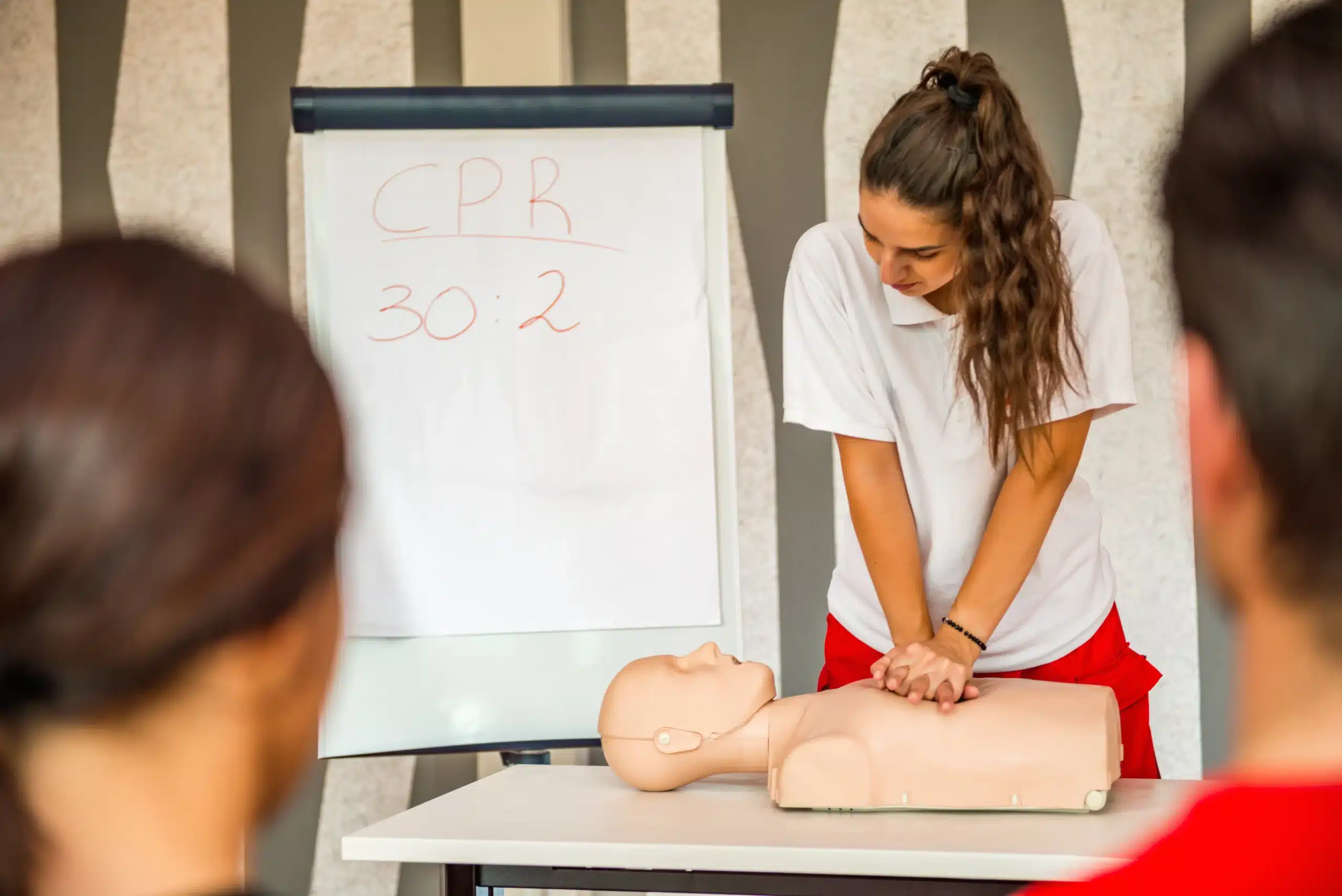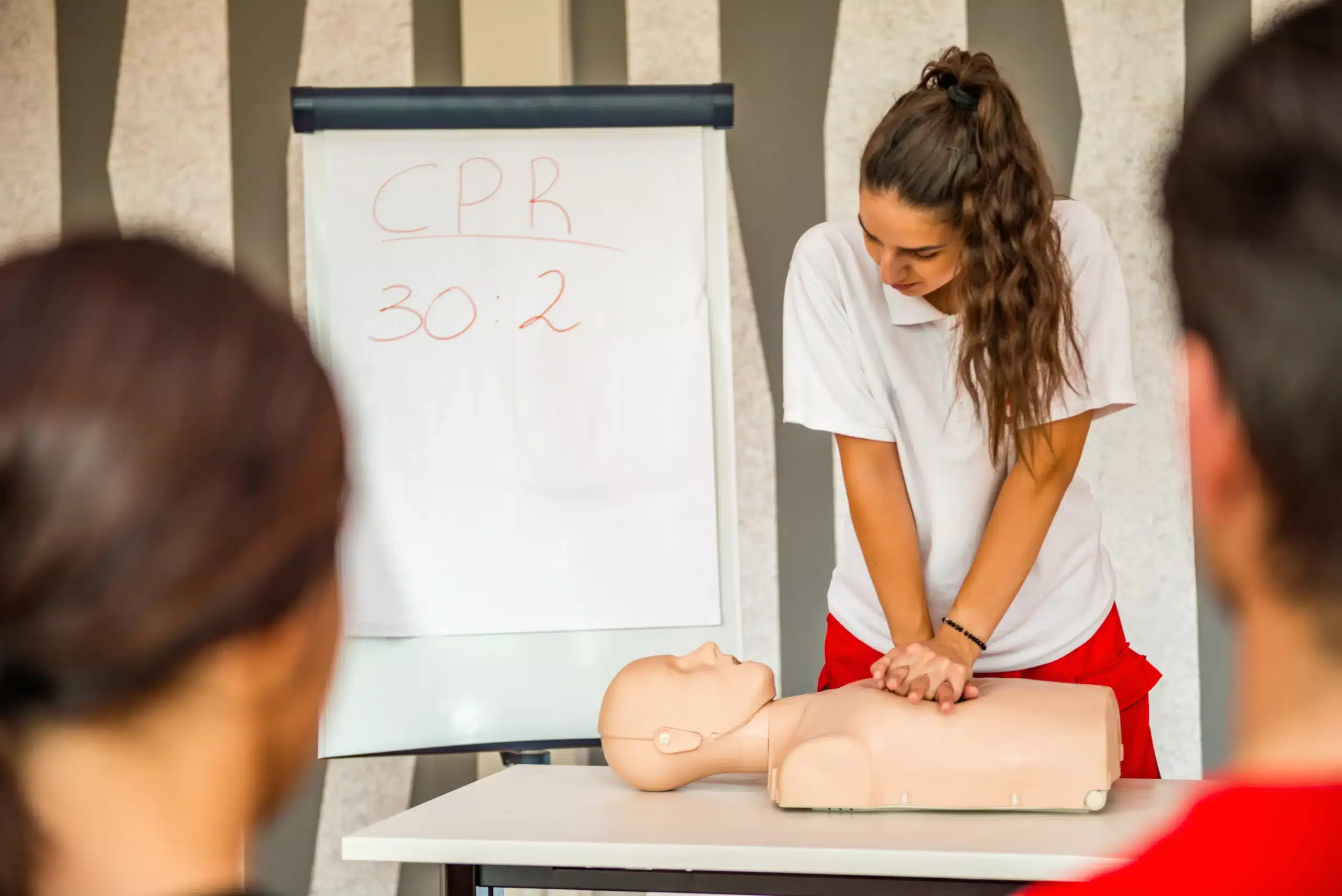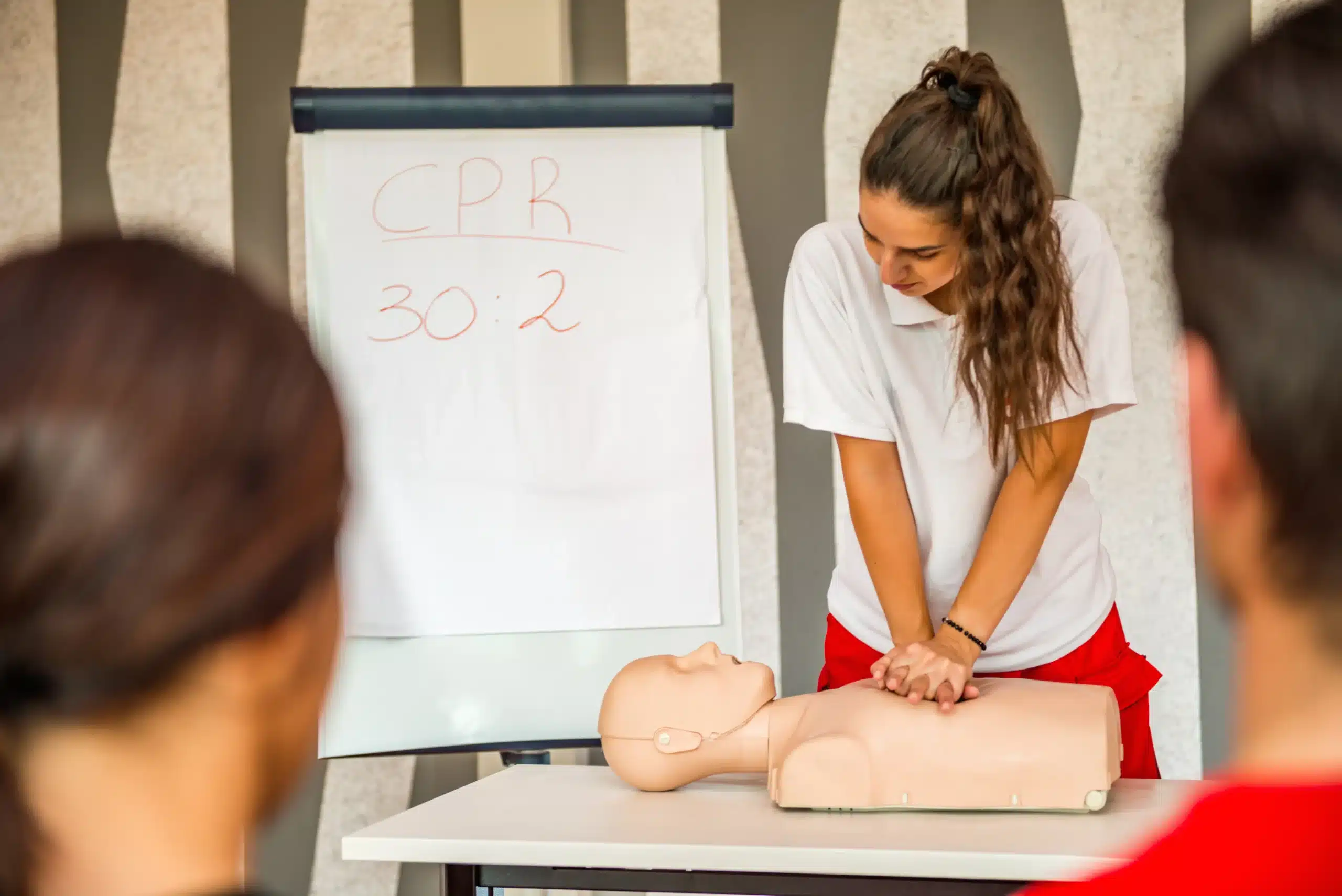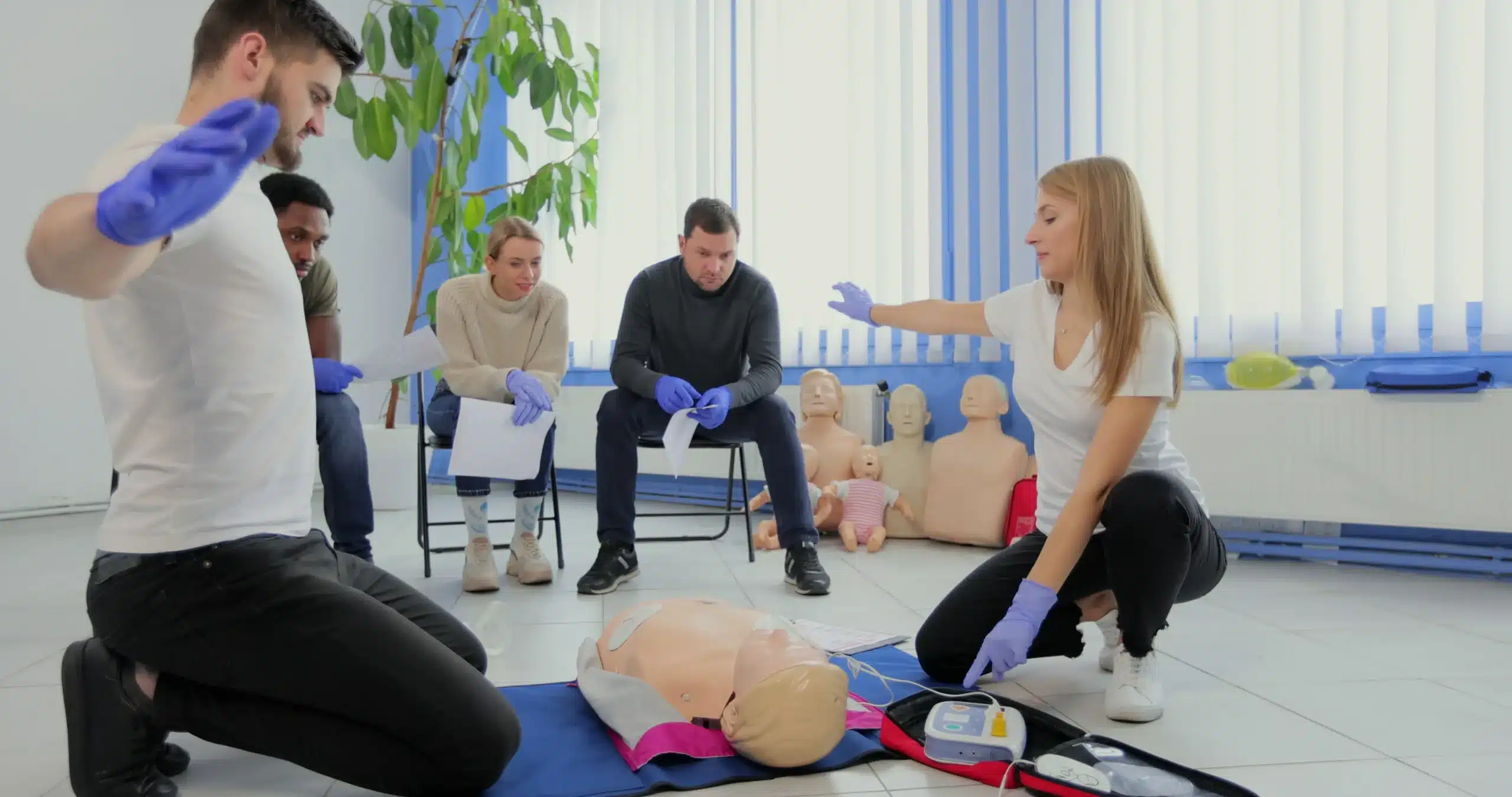Life can throw unexpected challenges our way, and being prepared for medical emergencies is a powerful skill to have. CPR training in Concord equips you with the knowledge and ability to respond effectively in critical situations. This guide explores the various CPR and First Aid training options available in Concord, including BLS, ACLS, and PALS certifications. We’ll discuss the benefits of hands-on training, the value of AHA certification, and how to choose the right course for your needs. Whether you’re a healthcare provider, a community member, or simply someone who wants to be prepared, this guide will help you find the perfect CPR training in Concord.
Key Takeaways
- Find the right CPR class for your needs: Whether you’re a healthcare provider, caregiver, or simply want to be prepared, explore options like BLS, ACLS, PALS, and First Aid to find the best fit.
- CPR training is an investment in your community: Learning CPR empowers you to respond confidently to emergencies and potentially save lives. Explore resources in Concord, CA, to find a course near you.
- Hands-on learning is key to effective CPR: Look for training programs that prioritize practical skills development and offer ample opportunities for practice and feedback. This approach builds confidence and ensures you’re prepared for real-world situations.
What is CPR Training?
CPR training equips you with the life-saving skills to respond to cardiac and breathing emergencies. Different CPR courses cater to various needs and skill levels, from basic life support for everyday citizens to advanced training for healthcare professionals. Let’s explore the key types of CPR training offered at Concord CPR Classes:
BLS
Basic Life Support (BLS) provides the foundational knowledge and skills to perform CPR, use an automated external defibrillator (AED), and relieve choking. BLS certification is vital for healthcare professionals, first responders, and anyone who wants to be prepared for a medical emergency. It emphasizes high-quality CPR and teamwork, critical components of successful resuscitation. The training covers single-rescuer and team-based CPR for adults, children, and infants.
ACLS
Advanced Cardiovascular Life Support (ACLS) builds upon the fundamentals of BLS, delving into advanced techniques for managing cardiovascular emergencies. ACLS training covers topics such as airway management, intravenous (IV) drug administration, and electrocardiogram (ECG) interpretation. It’s essential for healthcare professionals who regularly encounter cardiac arrest and other life-threatening cardiovascular conditions.
PALS
Pediatric Advanced Life Support (PALS) focuses on the specialized skills needed to respond to medical emergencies involving infants and children. PALS courses teach providers how to recognize and manage respiratory distress, shock, and cardiac arrest in young patients. This training is crucial for pediatricians, nurses, paramedics, and other healthcare providers who work with children.
First Aid & CPR
Combining first aid and CPR training provides a comprehensive skill set for handling a wide range of emergencies. First aid covers treating injuries like cuts, burns, and fractures, while CPR addresses life-threatening breathing and cardiac events. This combined training empowers individuals to respond effectively to various situations, from minor injuries to major medical crises. Concord CPR Classes offers this combined training to provide a well-rounded approach to emergency preparedness.
Find Top CPR Training in Concord
Finding the right CPR training can feel overwhelming, but several excellent resources are available in Concord. Whether you’re a healthcare professional maintaining your certifications or someone wanting to learn essential life-saving skills, this list can help you find the perfect fit.
Concord CPR Classes
Concord CPR Classes offers a wide range of American Heart Association (AHA) certified courses. You can find everything from basic CPR and First Aid to more advanced certifications like BLS, ACLS, and PALS. They also offer specialized courses such as NRP and training specifically designed for California childcare providers. This comprehensive selection makes them a one-stop shop for all your CPR training needs. For larger groups, they also offer discounted rates, making it a cost-effective choice for workplaces or community organizations. Learn more about their BLS, ACLS, and PALS courses, or explore their group discount options.
CPR Training Center
Serving the greater Bay Area, CPR Training Center provides AHA-certified courses in CPR, BLS, ACLS, and PALS. Their convenient locations in Concord and surrounding areas, including San Ramon, Brentwood, Walnut Creek, Pleasant Hill, and Antioch, make it easy for Contra Costa County residents to access training. Visit their website to view their course schedule.
Safety Training Seminars
With a focus on affordability and convenience, Safety Training Seminars offers AHA-certified courses in BLS, ACLS, PALS, CPR, and First Aid. Their streamlined approach makes it easier for busy professionals and individuals to acquire these vital skills. Learn more about their offerings on the Concord CPR Classes website.
American Red Cross Concord Chapter
The American Red Cross is a trusted name in emergency preparedness, and their Concord chapter offers CPR training. Their courses cater to both healthcare providers and the general public, ensuring everyone can learn these essential skills. Explore their course catalog and find a class near you.
CPR Training Costs & Value
Knowing the cost of CPR training and what you get for your money helps you make informed decisions. Let’s break down course pricing, available discounts, and what’s included with your registration.
Course Prices
CPR training costs vary based on the type of course and location. For example, BLS certification may have a different price than ACLS or PALS certification. Concord CPR Classes offers competitive rates and a low-price guarantee. Check their website for current prices in the Concord area.
Group Discounts
If you’re coordinating training for a group, such as your workplace or a community organization, ask about group discounts. These can make training more affordable and accessible. This is a smart option for businesses training staff or for groups of friends and family members learning together.
Included with Course
Your CPR training course typically includes several key components. You’ll receive comprehensive instruction from qualified instructors, often healthcare providers, in a comfortable learning environment. Upon successful completion, you’ll earn an American Heart Association certification card, valid for two years. This certification validates your life-saving skills and is often required for many professions. Some courses also include additional resources, such as manuals or online materials, to reinforce what you’ve learned.
Schedule Your CPR Training
Finding the right CPR training in Concord is easier than you think. With various options available, you can find a course that fits your schedule and learning style.
Class Options
You have several solid choices for CPR training in Concord. For American Heart Association (AHA) certified courses like CPR, BLS, ACLS, and PALS, check out the CPR Training Center. They serve Concord, San Ramon, Brentwood, Walnut Creek, Pleasant Hill, Antioch, and the surrounding Contra Costa County area. Another excellent option is Safety Training Seminars, also offering AHA-certified courses in BLS, ACLS, PALS, CPR, and First Aid. They even have specialized courses like NRP and those designed for California childcare providers.
Course Length & Schedule
Course length varies depending on your experience and the specific course. Many programs incorporate online components, offering flexibility and allowing you to learn at your own pace. This blended learning approach can make it much easier to fit training into a busy schedule. For more information on course length and what to expect, Concord CPR Classes offers helpful resources on course preparation. Classes are offered daily in Concord and other Bay Area cities. If you’re a medical professional needing a quick certification, look into the RQI (Resuscitation Quality Improvement) program, known for its streamlined and convenient training experience.
Register for a Class
Registering for a class is straightforward. Visit the training center’s website and select the date and time that works best for you. Keep in mind that schedules can change, so check the website for the most up-to-date information. CPR Training Center, for example, posts their updated schedule online.
Benefits of CPR Training
CPR training equips you with the skills and confidence to respond effectively in medical emergencies. It’s more than just a certification—it’s about empowering yourself to make a difference. This section highlights the key advantages of CPR training.
Hands-on Practice
CPR isn’t learned through textbooks alone. The ability to perform CPR effectively comes from repeated practice and simulated real-life scenarios. Concord CPR Classes understand this, emphasizing hands-on learning in a low-stress environment. This practical approach, led by experienced healthcare providers, builds muscle memory and confidence, ensuring you’re prepared to act quickly and efficiently under pressure. Flexible scheduling, especially for group training, makes it easier to fit these essential skills into your busy life.
AHA Certification
Earning certification demonstrates your commitment to high-quality training. Concord CPR Classes offers American Heart Association (AHA) certified courses, the gold standard in CPR training. This accreditation ensures your training aligns with the latest scientific guidelines and best practices. Whether you need BLS, ACLS, PALS, CPR, or First Aid certification, an AHA certification from Concord CPR Classes validates your skills and knowledge to potential employers and healthcare organizations.
Emergency Preparedness
CPR training prepares you for the unexpected. Knowing how to respond in a medical crisis can significantly impact the outcome. Concord CPR Classes notes that effective bystander CPR can double or even triple a person’s chances of survival after cardiac arrest. This training empowers you to act decisively and potentially save a life while waiting for professional medical help to arrive.
RQI Program
For medical professionals needing a streamlined certification process, the RQI program offered by Concord CPR Classes is a valuable option. This program combines online learning with a practical skills test using a voice-assisted mannequin. You can receive your certification card the same day you complete the program, ensuring you’re always ready to provide critical care. This efficient approach makes maintaining your certification hassle-free.
Your CPR Training Experience
From the moment you walk into the classroom, your CPR training in Concord is designed to be comfortable and supportive. Our experienced healthcare providers cultivate a low-stress learning environment, so you can focus on absorbing these essential life-saving skills. We offer CPR classes daily in Concord and other Bay Area cities, making it easy to find a time that works for you.
Classroom Learning
Concord CPR classes prioritize hands-on learning, giving you ample opportunity to practice the techniques you learn. Our instructors guide you through each step, ensuring you feel confident in your abilities. We keep our class sizes small to provide personalized attention and address any questions you may have. This personalized approach makes learning more effective and helps build camaraderie among participants. Learn more about our group discounts for an even more affordable and engaging experience.
Skills Assessment
We use a variety of methods to assess your skills throughout the training. Real-time feedback is a key component, helping you refine your technique and improve your performance. We may use computer-based audiovisual systems that offer corrective instructions during practice scenarios. These systems, along with devices that monitor compression rate, depth, release, and hand position, are invaluable for developing and retaining crucial CPR skills.
Certification
Once you successfully complete the course, you’ll receive an official American Heart Association (AHA) certification card, valid for two years. This nationally recognized certification demonstrates your proficiency in CPR and enhances your qualifications for various jobs and volunteer opportunities. The BLS Provider Course Completion Card is highly regarded in healthcare and other related fields. You can find more information about our BLS certification course on our website. We also offer the RQI program for medical professionals seeking a streamlined certification process.
Renew Your CPR Certification
Keeping your CPR skills sharp is crucial for responding effectively in emergencies. Regular renewal ensures you’re always prepared to provide assistance when needed.
Renewal Requirements
CPR certifications, like the American Heart Association’s Basic Life Support (BLS) certification, are typically valid for two years. To maintain your credentials and stay up-to-date with the latest guidelines from the American Heart Association, you’ll need to complete a renewal course before your current certification expires. This involves demonstrating your skills and knowledge through practical assessments and written exams.
Continuing Education
Beyond renewing your basic CPR certification, continuing education is essential, especially for healthcare providers. Advanced Cardiovascular Life Support (ACLS) courses offer in-depth training in advanced life-saving techniques. These courses cover a broader range of emergency scenarios and provide healthcare professionals with the skills to manage complex situations. Concord CPR Classes offers ACLS certification to help you expand your knowledge and maintain your proficiency in advanced life support. Regularly participating in continuing education demonstrates your commitment to providing high-quality care and ensures you’re equipped with the most current practices.
Choose the Right CPR Training
Finding the right CPR training program involves considering several key factors. It’s not just about learning the techniques; it’s about gaining the confidence and skills to act effectively in a real emergency. Here’s what to look for:
Accreditation & Certification
First and foremost, confirm the program’s accreditation and certification. A reputable program should offer certification from a nationally recognized organization like the American Heart Association (AHA). AHA-certified courses ensure your training aligns with established standards and guidelines, giving you a credible and widely accepted certification. This is especially important for healthcare professionals and those in regulated industries.
Instructor Experience
The instructor’s experience plays a significant role in your learning. Look for courses taught by experienced healthcare providers who can share real-world insights and create a comfortable learning environment. Experienced instructors can answer your questions effectively and offer practical tips based on their firsthand knowledge. For a low-stress learning environment led by healthcare professionals, consider Concord CPR Classes.
Course Variety
Different people have different training needs. A good training center should offer a range of courses to cater to various requirements. Look for a program that provides options like BLS, ACLS, PALS, First Aid, and CPR. This variety allows you to choose the training that best suits your personal or professional goals. Concord CPR Classes offers a comprehensive selection of courses including BLS, ACLS, and PALS certification.
Facility & Equipment
Hands-on practice is essential for mastering CPR skills. The training facility should have up-to-date equipment and resources to simulate real-life scenarios. This practical experience builds your confidence and prepares you to respond effectively in an actual emergency. Ensure the facility provides a realistic training environment with the necessary equipment for a comprehensive learning experience.
Address CPR Training Concerns
It’s normal to have questions or concerns about CPR training. Let’s address some common ones:
Time Constraints
We understand that fitting another commitment into your busy schedule can be tricky. Many people worry about how CPR training will impact their work or family life. At Concord CPR Classes, we offer a variety of course times and formats to accommodate different schedules. Check out our class options to find one that works for you. We also offer discounted group classes, a great option for coordinating training with colleagues or friends. For medical professionals needing a quick and efficient way to renew their certification, our RQI program offers flexible online learning combined with convenient in-person skills sessions.
Training Anxiety
Some people feel apprehensive about performing CPR, especially in a simulated emergency. It’s perfectly natural to feel this way. Our instructors create a supportive and encouraging learning environment and prioritize making students feel comfortable. Our classes emphasize hands-on practice and provide ample opportunity to ask questions and receive personalized feedback. This approach helps students build the skills and confidence they need to respond effectively in a real emergency. A recent study highlighted the anxiety nursing students sometimes experience during CPR training, emphasizing the importance of a supportive learning environment.
Skill Retention
One of the biggest concerns after completing CPR training is remembering what to do in a real emergency. At Concord CPR Classes, we focus on practical skills development and use proven teaching methods to maximize skill retention. Our instructors provide clear demonstrations, offer constructive feedback, and encourage active participation. Research shows that using technology like automated feedback devices during training can significantly improve both performance and skill retention.
Online vs. In-Person
Deciding between online and in-person CPR training depends on your learning style and preferences. Online courses offer flexibility and convenience, allowing you to learn at your own pace. However, in-person classes at our Concord location provide hands-on practice and direct interaction with an experienced instructor. This is essential for developing the muscle memory and confidence needed to perform CPR effectively. While some online programs meet certification requirements, they may not offer the same level of practical skill development as in-person training. If you’re unsure which format is right for you, consider your learning style and the importance of hands-on practice in mastering CPR techniques. For more insights into the challenges and benefits of different training approaches, check out this helpful resource.
Related Articles
- CPR Classes in Concord, CA: Your Complete Guide – Concord CPR Classes
- Why CPR is Critical in Healthcare
- AHA ACLS Classes in Concord, CA – Concord CPR Classes
- AHA PALS Classes in Concord, CA – Concord CPR Classes
- The Importance of Workplace CPR and First Aid Training
Frequently Asked Questions
What are the different types of CPR training available? CPR training ranges from basic life support (BLS) for the general public to advanced courses like Advanced Cardiovascular Life Support (ACLS) and Pediatric Advanced Life Support (PALS) for healthcare professionals. First Aid training is often included with CPR instruction to provide a well-rounded approach to emergency preparedness. Concord CPR Classes offers a variety of courses to meet different needs.
How much does CPR training cost, and what does it include? CPR training costs vary depending on the course type and location. Concord CPR Classes offers competitive pricing and a low-price guarantee. Your course fee typically covers instruction from certified professionals, course materials, and an official American Heart Association certification card valid for two years. Ask about group discounts for workplaces or community organizations.
How can I fit CPR training into my busy schedule? Concord CPR Classes offers various class times and formats, including weekday, weekend, and evening options, to accommodate busy schedules. Many programs incorporate online learning components for added flexibility. The RQI program is a streamlined option for medical professionals seeking quick recertification.
What if I’m nervous about performing CPR in a real emergency? It’s completely normal to feel apprehensive. Concord CPR Classes creates a supportive learning environment with experienced instructors who prioritize student comfort. Hands-on practice and personalized feedback help build confidence and prepare you to respond effectively under pressure.
How can I make sure I remember what I learned after the training? Concord CPR Classes emphasizes hands-on practice and uses proven teaching methods to maximize skill retention. Real-time feedback during training helps refine your technique, and many courses include resources to reinforce learning after the class. Regularly reviewing the material and practicing with friends or family can also help maintain your skills.


